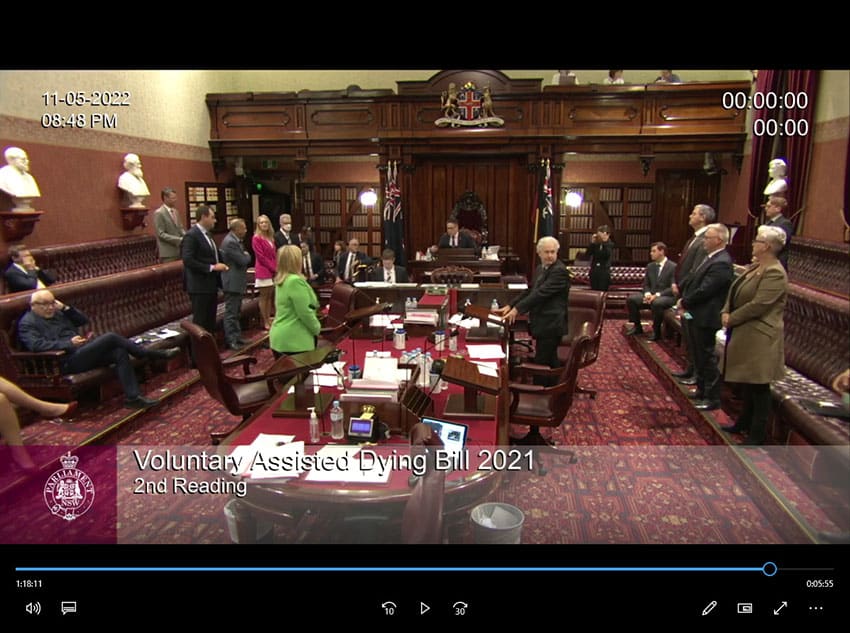
Conscience votes are described as those of “moral or social significance” that “generally reflect morally and socially divisive issues of the time”. When members of parliament debate and vote on these matters, the electorate assumes that their consciences will be fully engaged.
Could anything be more morally and socially significant or divisive than questions of life and death?
Aside from the heinous abortion laws passed just three years ago, at no other point have our politicians been asked to make it legal for one person to actively end the life of another.
A bowtie?
Given the radical change the NSW euthanasia and assisted suicide law will make to our medical profession and indeed, society more broadly, it was probably the most consequential vote members of parliament will ever make in their careers.
Yet in the five minutes between the ringing of the bells and the Second Reading vote to legalise euthanasia in NSW, the assembled members were preoccupied with Nationals MLC Ben Franklin’s bowtie.
So much for engaged consciences.
A most unparliamentary atmosphere
The Animal Justice Party’s Emma Hurst and the Greens’ Cate Faehrmann and Abigail Boyd cracked jokes at Mr Franklin’s expense, asking whether he was aiming for some one-upmanship over a former parliamentary colleague who had attended an event in parliament earlier that day, uncharacteristically wearing a tie.
The Nationals’ Bronnie Taylor, the Minister for Mental Health, Regional Youth and Women (who didn’t appear phased at how devastating this bill would be for those covered by her portfolio) joined in the fun, as did Labor’s Mick Veitch, John Graham and Penny Sharpe.
Perhaps it was just a bit of friendly banter amongst colleagues who were coming to the end of a very long day and an emotional debate.
But is there no difference between the moral tone of Parliament and playful conversations at a weekend barbecue or the parliamentary Christmas party?
Maybe it was too much to ask. Maybe I’m letting my own absolute hatred of this law and what it means colour my expectations of those involved in its passage. It’s certainly possible.
It’s also possible that my horror is justified, because our MPs have become so desensitised to the culture of death that all a “conscience” vote seems to mean these days is a day off party and parliamentary discipline.
Almost as if they don’t understand at all
The inability of MPs to treat a life and death decision with appropriate solemnity was both disconcerting and unnerving.
The seamless transition from the final second reading speeches about the bill to a laugh over bowties, and then to the vote with all its grim consequences, leaves one wondering how much weight our parliamentarians give to other matters of conscience.
Going further, one wonders how many of the current crop of politicians have the tools to truly weigh the moral considerations involved in such a decision.
An intellectually arid vista
Catholics perhaps forget that while we operate in a moral framework inspired by Scripture and Tradition, liturgy, philosophy, the lives of the Saints and the realities of spiritual and community life, secular moral reasoning takes place within a much more threadbare framework.
It involves utilitarian questions of maximising pleasure in the absence of meaning for suffering and pain, or a sense of obligations to loved ones and “communities” that may not entirely cohere, or the assertion of absolute “choice” as the only true good in life, or even worse, naked political “friend/enemy” calculations.
That some parties and parliamentarians are hostile to religious faith and want to exclude it from the public debate and from this debate in particular is nothing new, because it not only complicates the way they make moral decisions, but adds a level of tragedy, seriousness, and meaning to moments like last week’s vote.
Without faith, life’s at risk of becoming just a series of jokes about bowties.
Over the course of this debate we’ve also seen some treat their Christian faith in an unserious way; the recent letter from the former Archbishop of Canterbury, George Carey, and the refusal of the Uniting Church to stand against euthanasia, being just two examples.
Faith takes courage
In the place of real faith, which takes courage, Christian supporters of euthanasia practice what sociologist Christian Smith calls “moralistic therapeutic deism”: a belief that “God” exists, that he/she wants people to be good and nice and fair to each other, and that the central goal of life is for people to be happy and to feel good about themselves.
The problem with those who ascribe to such a “faith” is that those who hold it are completely oblivious to the fact that they have exchanged authentic religion for something that cannot possibly guide their moral choices—because it makes no moral demands upon them. Perhaps Bishop James Conley had it right when he said: “The greatest trick of the devil isn’t convincing the world he doesn’t exist—it’s convincing the world that Jesus Christ is the champion of his causes.”
We are left mourning the introduction of euthanasia, but as Scripture says, there is “a time to weep, and a time to laugh” (Eccles. 3:4).
Even though our State has now fully embraced the culture of death, at least the Catholic Church remembers which time is which.
Related
